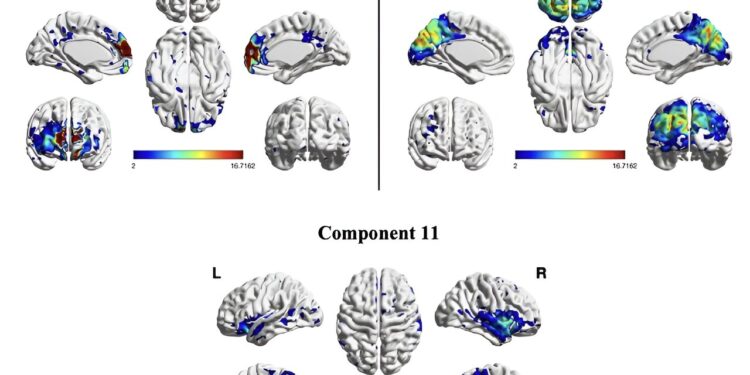Mindfulness induction reduced intrinsic DMN connectivity compared to controls (MI
Mindfulness practices are meditative exercises that encourage people to be aware of what they are experiencing in the present moment, while trying not to interpret or judge these experiences. Studies have shown that these practices can have many benefits, such as reducing stress, improving sleep quality, and promoting emotional processing.
Exercises aimed at promoting mindfulness (i.e. a mental state marked by openness, awareness and attention to the present moment) are now used as psychotherapeutic tools in many countries around the world. They are also a crucial part of many psychotherapeutic approaches, such as Mindfulness-Based Cognitive Therapy (MBCT), Acceptance and Commitment Therapy (ACT), and Mindfulness-Based Stress Reduction Program ( MBSR) created by Professor Jon Kabat-Zinn.
Researchers from the University of Wisconsin-Madison and Virginia Commonwealth University recently conducted a study to investigate the effects of brief mindfulness practices on the organization of large-scale brain networks and aggression. of the intimate partner.
Their findings, published in Cognitive, affective and behavioral neurosciencesuggest that even a few minutes of attention-based mindfulness meditation training results in noticeable changes in the activity and organization of crucial neural networks.
“Mindfulness can produce neuroplastic changes that support adaptive cognitive and emotional functioning,” Hadley Rahrig, Liangsuo Ma and colleagues wrote in their article.
“Recently, interest in teaching mindfulness through a single exercise has increased significantly due to the advent of mobile health technology. As a result, the present study sought to extend the neural models of mindfulness by studying transient states of mindfulness during single-dose exposure to focused attention meditation.”
The data analyzed by Rahrig, Ma, and their colleagues were collected as part of a larger study examining romantic relationships. This study involved 51 adult heterosexual couples who had been dating for at least six months.
These couples were separated and asked to complete either a 10-minute mindfulness meditation practice or a 10-minute relaxation exercise. These participants’ brain activity was recorded using magnetic resonance imaging (MRI), a non-invasive technique that captures images of the brain or other structures in the human body using waves magnetic and radio.
The couples were then also asked to complete a task assessing their behavioral aggression, in which they had to press a button faster than their opponents. These opponents, in fact automated by a computer program, would be either a stranger, a close friend, or their intimate partner.
The team’s analysis of the experimental data yielded some interesting results, which are consistent with other findings collected in the past. Specifically, the researchers found that the 10-minute mindfulness meditation exercise increased functional connectivity within the frontoparietal control network (FPCN) and salience network (SN), while reducing coherence within the network. said in default mode (DMN).
Although it influenced brain connectivity patterns, the short mindfulness training did not have a significant impact on the aggression participants demonstrated toward those they believed to be their romantic partners during the course. of the behavioral task. This does not necessarily mean that mindfulness practices do not help reduce aggressive behavior, but simply suggests that such short training does not.
“Mindfulness instruction reduced coherence within the default mode network and increased functional connectivity within the frontoparietal control and salience networks,” Rahrig, Ma, and colleagues wrote.
“Furthermore, mindfulness decoupled primary visual and attention-related networks. Yet this induction was unable to cause changes in subsequent intimate partner aggression, and such aggression was largely not associated to any of our network indices. These results suggest that minimal doses of attention-focused mindfulness may promote transient changes in large-scale brain networks that have uncertain implications for aggressive behaviors.
Overall, the results collected by these researchers show that even a short mindfulness meditation exercise can influence the organization and activity of large-scale neural circuits.
Based on the changes observed in participants’ brains after the exercises, Rahrig, Ma and their colleagues hypothesize that mindfulness promotes decoupling between brain regions associated with processing visual stimuli and neural networks linked to attention.
This recent study may soon pave the way for more in-depth research exploring the impact of occasional and regular mindfulness practices on neural connectivity, intimate partner aggression, and perhaps other behaviors exhibited in romantic relationships. Collectively, this work could help unveil other potential benefits of mindfulness exercises and their effects on the brain.
More information:
Hadley Rahrig et al, Inside the Mindful Moment: The Effects of a Brief Mindfulness Practice on Large-Scale Network Organization and Intimate Partner Aggression, Cognitive, affective and behavioral neuroscience (2023). DOI: 10.3758/s13415-023-01136-x.
© 2023 Science X Network
Quote: Exploring the impact of short mindfulness practices on intimate partner aggression (November 29, 2023) retrieved November 30, 2023 from
This document is subject to copyright. Except for fair use for private study or research purposes, no part may be reproduced without written permission. The content is provided for information only.



